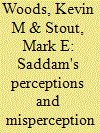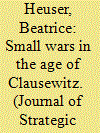| Srl | Item |
| 1 |
ID:
093804


|
|
|
|
|
| Publication |
2010.
|
| Summary/Abstract |
A large collection of captured documents from the very highest levels of the Iraqi government offers a chance to gain insight into why Saddam Hussein was unwilling and unable to alter his strategy on the eve of the 2003 war that toppled his regime. This paper explores some of the perceptions and misperceptions that Saddam Hussein took away from the 1991 Gulf War and shows how they affected his decisionmaking on the eve of the war in 2003. It concludes with some thoughts on the policy implications of these findings.
|
|
|
|
|
|
|
|
|
|
|
|
|
|
|
|
| 2 |
ID:
093806


|
|
|
|
|
| Publication |
2010.
|
| Summary/Abstract |
Around the time of Clausewitz's writing, a new element was introduced into partisan warfare: ideology. Previously, under the ancien rgime, partisans were what today we would call special forces, light infantry or cavalry, almost always mercenaries, carrying out special operations, while the main action in war took place between regular armies. Clausewitz lectured his students on such 'small wars'. In the American War of Independence and the resistance against Napoleon and his allies, operations carried out by such partisans merged with counter-revolutionary, nationalist insurgencies, but these Clausewitz analysed in a distinct category, 'people's war'. Small wars, people's war, etc. should thus not be thought of as monopoly of either the political Right or the Left.
|
|
|
|
|
|
|
|
|
|
|
|
|
|
|
|
| 3 |
ID:
093805


|
|
|
|
|
| Publication |
2010.
|
| Summary/Abstract |
Traditionally regarded as a secondary activity in military thinking and practice, the notion of counter-insurgency (COIN) has undergone a remarkable renaissance. This analysis traces the origins of this renaissance to two distinctive schools: a neo-classical school and a global insurgency school. The global insurgency school critiques neo-classical thought and presents itself as a more sophisticated appreciation of current security problems. An examination of the evolution of these two schools of counter-insurgency reveals how the interplay between them ultimately leaves us with a confused and contradictory understanding of the phenomenon of insurgency and the policies and strategies necessary to combat it.
|
|
|
|
|
|
|
|
|
|
|
|
|
|
|
|